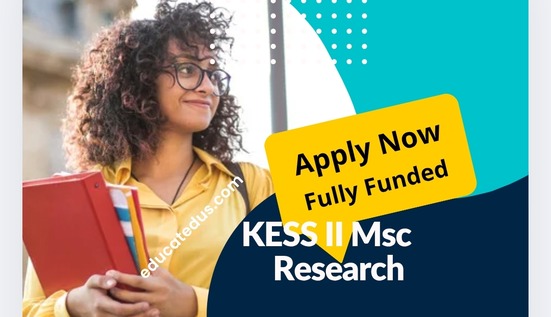KESS II Fully Funded MSc Research Scholarship 2025/2026: Development of Environmentally Friendly Nanomaterials for Surface Coatings
KESS II Fully Funded MSc Research Scholarship 2025: Discover the application process and Requirements
The KESS II (Knowledge Economy Skills Scholarships) programme offers fully funded MSc research opportunities for students in East Wales. This prestigious scholarship focuses on developing environmentally friendly nanomaterials for various surface coatings, addressing critical environmental challenges in materials science.
Read Also: Funding, Graduation, and Awards at the University of Birmingham: A Comprehensive Guide
About the KESS II Scholarship Programme
The KESS II scholarship programme represents a collaborative initiative between Welsh universities, industry partners, and the Welsh Government. Part-funded by the Welsh Government’s European Social Fund (ESF) convergence programme for East Wales, this scholarship provides exceptional opportunities for postgraduate research in cutting-edge fields.
Research Focus: Green Nanomaterials for Surface Coatings
The Energy Safety Research Institute (ESRI) leads groundbreaking research in developing sustainable alternatives to conventional waterproof coatings. Current waterproof materials rely heavily on fluorocarbons, which are:
- Bio-persistent and environmentally hazardous
- Extremely expensive to produce
- Difficult to dispose of safely
ESRI’s innovative approach focuses on creating green nanomaterials that offer superior performance while maintaining environmental safety. These novel materials can be applied to various surfaces, making them safer for human contact and environmentally sustainable.
Research Objectives and Responsibilities
Successful scholarship recipients will contribute to revolutionary research in sustainable materials science. Key responsibilities include:
Surface Analysis and Identification
- Identifying target surfaces for coating applications
- Evaluating material compatibility and performance requirements
Method Development
- Developing innovative application techniques for nanomaterial coatings
- Optimizing coating processes for maximum efficiency
Data Management and Analysis
- Gathering comprehensive research data
- Preparing detailed analytical reports
- Presenting findings to academic and industry stakeholders
Environmental Impact and Benefits
This research offers substantial environmental and social benefits:
Environmental Advantages
- Reduced toxic waste from fluorocarbon production
- Improved recyclability of coated products
- Enhanced product durability and longevity
Quality of Life Improvements
- Safer materials for consumer products
- Reduced health risks from hazardous coatings
- Increased consumer satisfaction through improved product performance
Scholarship Structure and Duration
The KESS II scholarship provides comprehensive support through a collaborative framework:
- Duration: 1 year of funded research plus 3 months for thesis completion
- Partnership: Collaboration with SMEs, micro companies, and public/third sector organizations
- Skills Development: Mandatory Postgraduate Skills Development Award (PSDA) – 40 credit programme
Eligibility Requirements
Academic Qualifications
Candidates must possess:
- Minimum 2:1 undergraduate degree in:
- Chemistry
- Physics
- Materials Science
- Chemical Engineering
- Related scientific disciplines
Residency and Work Authorization
- Home address in East Wales at registration and enrollment
- Right to work in East Wales upon scholarship completion
- UK fees eligibility status
English Language Requirements
International applicants must meet Swansea University’s English Language Requirements.
Financial Benefits and Support
The KESS II scholarship provides comprehensive financial support:
Tuition Coverage
- Full UK tuition fees covered
- No additional fee obligations
Living Stipend
- Annual bursary up to £11,937
- Amount determined by financial assessment
- Based on KESS II EAST Participant Proposal Form evaluation
Research Funding
- Additional funds for research expenses
- Equipment and materials support
- Conference and presentation opportunities
Application Process
Interested candidates should visit the official university website for:
- Detailed application procedures
- Required documentation
- Application deadlines
- Contact information for queries
Frequently Asked Questions (FAQ)
1. What is the KESS II scholarship programme and who is eligible?
The KESS II (Knowledge Economy Skills Scholarships) programme is a fully funded MSc research scholarship initiative for students in East Wales. Eligibility requires a 2:1 undergraduate degree in Chemistry, Physics, Materials Science, Chemical Engineering, or related fields, along with a home address in East Wales and UK fees status.
2. How long does the KESS II scholarship last and what does it cover?
The scholarship provides 1 year of funded research plus an additional 3 months for thesis completion. It covers full UK tuition fees, provides an annual stipend up to £11,937 (subject to financial assessment), and includes additional funds for research expenses.
3. What research will I be conducting with this KESS II scholarship?
Recipients will work with the Energy Safety Research Institute (ESRI) to develop environmentally friendly nanomaterials for surface coatings. This involves identifying target surfaces, developing application methods, analyzing data, and presenting results as alternatives to harmful fluorocarbon-based coatings.
4. Who funds the KESS II scholarship programme?
The KESS II programme is part-funded by the Welsh Government’s European Social Fund (ESF) convergence programme for East Wales. It operates as a collaborative initiative between Welsh universities, industry partners including SMEs and micro companies, and public/third sector organizations.
5. What additional requirements must KESS II scholars complete?
All KESS II EAST scholars must complete a Postgraduate Skills Development Award (PSDA), which is a mandatory 40-credit programme. This requirement ensures scholars develop comprehensive research and professional skills alongside their primary research project.


